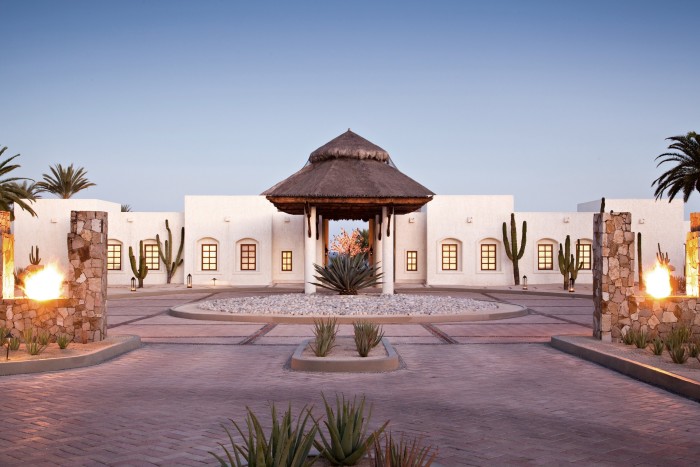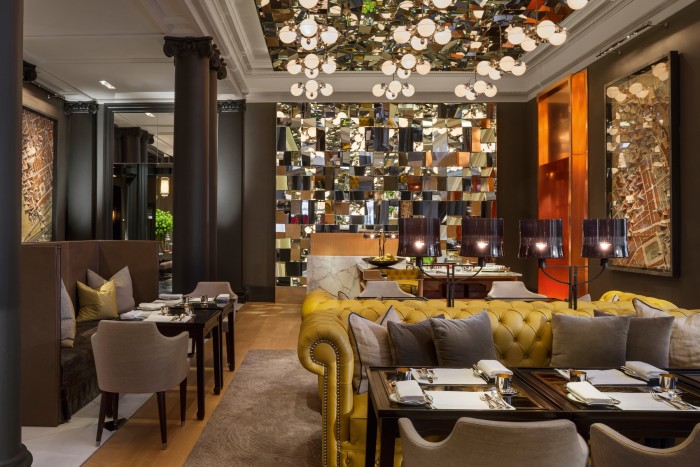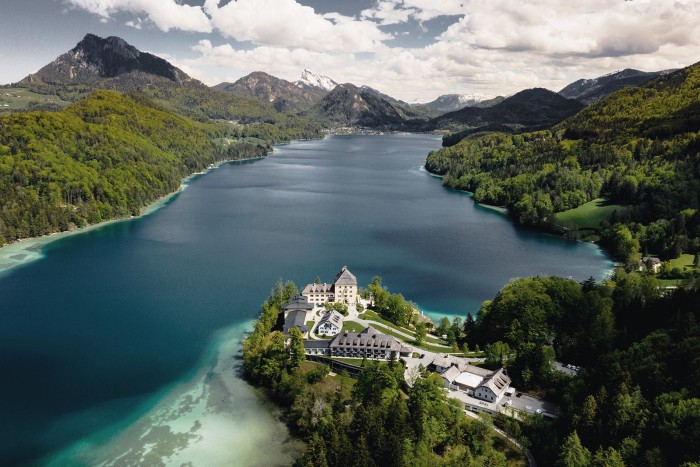Sonia Cheng: ‘The key is to design a hotel that doesn’t feel like a hotel’

Roula Khalaf, Editor of the FT, selects her favourite stories in this weekly newsletter.
Sonia Cheng walks into the Butterfly Pâtisserie at the Hôtel de Crillon at 10am on the dot on a Saturday. The 42-year-old CEO of Rosewood Hotel Group – which in 2017 assumed management of this Parisian institution, commissioned by Louis XV in 1758 – is wearing a fawn-coloured Saint Laurent blazer over a white T-shirt, a thick gold-snake chain and an aura of total focus. It’s Fashion Week, she’s here for only three days, and she has a lot on her plate: she arrived from Hong Kong, where she lives with her husband and five children, and went straight to a handful of shows. In two hours’ time she will co-host a lunch for 22 with Laure Hériard Dubreuil, the founder of Miami-based fashion powerhouse The Webster. She has just spent her breakfast being photographed in the hotel’s Bar Les Ambassadeurs for this magazine. She asks for coffee and says she’s “really jetlagged” – though when I’d entered the sumptuous fitness centre at what I thought an unconscionably early hour for a weekend morning, she was already wrapping up her workout.
As chief executive, Cheng oversees a hotel group with more than 40 properties in operation across 20 countries, of which 31 are Rosewoods, with almost as many in the works. She has simultaneously developed three more brands – a residences collection, a wellness concept and a members’ club – while sitting on several boards, including the Hong Kong Tourism Authority. She’s also vice-chairman of her family’s multibillion-dollar Chow Tai Fook Jewellery Group – one of the largest jewellery companies in the world, by market cap – whose parent, Chow Tai Fook Enterprises, capitalised much of Rosewood’s development. (She is reportedly effecting a modernisation of both its designs and the brand’s 7,700+ stores worldwide.)
So if focus trumps bonhomie for much of our meeting, fair enough. Speaking in a low voice at a fast clip, she is pleasant but never not crystally, didactically on message about what makes her, and Rosewood, tick.


In the 12 years since Cheng’s father, Cheng Kar-Shun (known as Henry), the billionaire chairman of Hong Kong-based New World Development (which includes New World Hotels, an Asia-based collection), acquired the Rosewood brand, its hotels have proliferated across six continents. Like most privately held companies, Rosewood doesn’t report financials, but said bookings to the end of Q3 2023 are up 47 per cent worldwide on 2019 and topline growth on revenue has exceeded 60 per cent in the past four years. In an industry projected to more than double from its current valuation of around $140bn to almost $300bn by 2030, they compete with the independent and multibrand conglomerate categories alike.
Its pipeline of 28 hotels is formidable even by industry leaders’ standards (Four Seasons, a behemoth with $4.3bn in revenue in 2022, has around 50). Rosewood’s reimagining of Venice’s storied Bauer Hotel, slated to open in 2025, is one of several heritage European projects, along with Amsterdam, Salzburg, Milan and Rome, all on the heels of Vienna opening last year, and Munich opening last week. Two resorts in Saudi Arabia, part of that country’s trillion-dollar-plus Vision 2030 development initiatives, will open by 2026, along with a Riyadh hotel. Weeks before we meet, Cheng signed a deal to take over the three award-winning Robertson Lodges in New Zealand. There are urban flagships on the way in Shanghai, Mexico City and – the most buzzed-about – a new, second hotel in London, where Rosewood is currently gutting the former US Embassy building on Grosvenor Square, with Sir David Chipperfield leading the architecture and interiors team.



“The key is to design a hotel that doesn’t feel like a hotel,” Cheng says. She wants to make environments to appeal as much to the next-door neighbour as to the guest who’s arrived from several time zones away. “That’s a very important ingredient of this brand; it’s how we’ve differentiated. We want to make it resonate with the neighbourhood, to make people say when they walk in, ‘This is a place I can hang out with my friends.’ We curate every single space [to that end].”
If all that lands a bit like boilerplate lifted straight from the press literature of Luxury Hotel Company X, consider the Rosewood London, whose 10th anniversary the company is celebrating this year – the first hotel Cheng opened after being appointed CEO, aged 28. She had a degree in applied mathematics from Harvard, and a few years each at Morgan Stanley and Warburg Pincus under her belt, but zero formal hospitality experience. The Edwardian pile on High Holborn was formerly part of the Renaissance chain. Sceptics (including your writer) questioned the wisdom of locating a property intended to compete with the likes of Claridge’s in the weird socio-demographic selva oscura between Covent Garden and Fleet Street. “People told me I was crazy, that we’d never be able to attract the foot traffic we’d need. But it’s such a beautiful building; I don’t think there’s another courtyard like that in any hotel in London,” she says.
Cheng introduced the Holborn Dining Room – an all‑day British brasserie with fire engine-red banquettes, waiters in fitted waistcoats and forage caps, and truffle fries and gourmet pies on the menu. Across the portico was Scarfes, a cocktail bar lined with bespoke cartoons by celebrated English illustrator Gerald Scarfe, presided over by world-class mixologists. Within a couple of months, both were doing brisk trades; the bar regularly had a queue out the door. In the hotel itself, the suites flowed like high-spec apartments: antique desks, minibars in lacquered oriental cabinets, proper kitchens with tile floors and gallery-hung walls. Cheng, known in the industry for having her hands deep in the design side of things (“I love it – I have a really strong team, but with certain flagship properties I still get quite involved”), had tapped Tony Chi and Martin Brudnizki (now a ubiquitous force in hotel design, but then still an emerging star).
Rosewood Beijing followed a similar strategy in 2014: create something unexpected for the city – sleek but laid-back, full of greenery, with a haute hot-pot café in place of the conventional Michelin-endorsed destination. Within three months of opening, Cheng says, its RevPAR (revenue per available room) was number one in the market, despite Rosewood having no other Asian presence and no loyalty programme.
Ten years and some 20 openings later, her disruptive successes have put paid to much of the nepo baby-centric speculation that initially surrounded her appointment – and made Rosewood popular with the industry’s blue-chip investment partners. The brand’s tagline, “A Sense of Place”, may predate her tenure as chief executive, but it’s Cheng who imbued it with the tangible signifiers that deliver returns.


Henry Cheng’s acquisition of the company was “brilliant move number one”, says James McBride, CEO of Nihi hotels and an industry doyen of almost 40 years. “Brilliant move number two was putting Sonia in charge.” For a decade before Cheng acquired Rosewood, McBride ran The Carlyle in New York, one of the most recognised names in its original portfolio; numerous colleagues from his time as a senior director at Ritz-Carlton have gone on to work with Cheng. McBride praises her “great instincts and engaged leadership”, her aptitude for site selection and conversion, and her skill at recruiting top talent (while hotel GMs who’ve found her management style to be overly controlling are not unheard of, more often what’s expressed is admiration). “The excitement, the momentum [that currently surrounds the brand] can be felt from afar. She has created that lightning-in-a-bottle thing, and I think she’s only getting started.”
But luxury hospitality moves fast. “My goal is to be a purpose-led luxury lifestyle brand,” she declares. “When people ask me, ‘Who are your hotel competitors?’ – of course, we have them, but in my mind I compare us to luxury brands; I want us to be learning from retail and fashion, those different spaces.” Making them an actual part of the Rosewood brand is in the strategy as well: the lunch Cheng hosts with Hériard Dubreuil in Paris is to celebrate a series of Rosewood-The Webster pop-ups in the US, a collaboration that will be evolved across more locations, possibly as permanent retail presences with private shopping privileges.
Sustainability is now in the mix “from the moment we start planning”, Cheng says, noting that today’s luxury consumers are more societally and environmentally conscious. “We need to build it [into the hardware], but also make it part of the experience.” The company recently inaugurated Rosewood Impacts as its official ESG initiative, but various policies and implementations go back years.



When I admit to having struggled with the lofty, vaguely worded Impacts literature her press office had provided, she immediately starts ticking off concrete executions: The Rosewood São Paulo, a new-build that opened in 2022, runs on 100 per cent renewable energy, has its own waste-management facilities, and around 75 per cent of building materials used were locally produced or upcycled (or both). Kona Village Resort, on Hawaii’s Big Island, which Rosewood re-flagged earlier this year, is now powered by 8,000 solar panels – the largest private micro-grid in the state, and the only one to run entirely on solar. She tells me the company is ahead of schedule on its 2050 carbon-neutrality target (which is more than can be said of a few big western democracies’ net-zero efforts).
Family travel is seen through this lens as well. “When we were first thinking about kids’ experiences in the hotels [years ago], one of my team members had all sorts of ideas for digital experiences, all focused on that kind of interface.” She looks at me in disbelief and laughs. “I just went, ‘Actually, no! The opposite! Hands-on, high-touch’” – get them in nature, into local communities. “They’re always in front of a screen at home, this is one of their only chances not to be. I mean, why are you even travelling?” She cites plans to create kids’ “learning retreats” at a Maldives resort slated to open in a couple of years – several-days-long educational programmes (“or 10 days, or even two weeks”), focused on marine conservation – as an example of the company’s direction.
Her other three brands – Rosewood Residences, Asaya (the company’s wellness concept, with currently just six locations, three in Asia) and Carlyle & Co, the members’ club – are moving ahead at different paces. “We launched Asaya in Hong Kong with the idea to have it be a holistic offering. That meant not just [spa] but nutritionists, a lot of post-maternity treatments, visiting practitioners.” I ask if she personally finds the wellness space interesting, and am politely stonewalled: “I think it has a lot of potential.” But does she find carving out a meaningful wellness brand in the luxury hotel market – where terms like biohacking and epigenetics now get thrown about as regularly as lomi lomi massage and lift facial once were – a challenge? “Our target audience obviously cares about wellbeing. So how does Rosewood play a role in facilitating that? But I don’t think we should overcomplicate it; just be authentic. I don’t believe in introducing fancy words just to differentiate.”
Developing residences is almost a business imperative, but it’s also a natural extension: Rosewood has managed apartments at The Carlyle since 2002, and sold holiday residences and townhouses from Vancouver to São Paulo to every location in Mexico in which it operates. In the past two years, Cheng has announced six standalone Rosewood Residences, unaffiliated with any hotel. “We get a lot of customers who say, I want this for my home – this exact design, this exact curation. So how do you take that notion and put it in a residence?” If the starting prices in Beverly Hills of $10mn are any indication, they’re succeeding.

Carlyle & Co, the members’ club Cheng launched two years ago, currently has just one location at present, atop the Rosewood Hong Kong – and she’s keeping schtum about where the next will open.
“We’re not about quantity here,” she says. “With membership, it’s always the right location and city. You know the Carlyle – it has such a rich soul. You walk in and might not feel it’s the grandest hotel ever; there are parts that are probably dated, the tables are maybe too close together at Bemelmans [Bar]. But there’s a sense of community that’s real. Somehow, it’s kind of a club, even though it’s not.” She “took the soul of all that” back to Hong Kong, recreating an outpost of the Café Carlyle, nightly jazz and all. It still, she says, has a waiting list for membership in the hundreds.
It’s a lot to be growing all at once, it seems to me; but clearly not to Cheng. “All these touch points are opportunities,” she says. “That’s the purpose of us being in this business, I think. We can be a platform for connecting people in communities, and enriching the places we operate in. We can play that role. I find it to be a very meaningful part of what we do.” It has the ring of the note she’d like to end on: very on-message, also like something she really believes, definitely like something she intends to make happen.

Comments